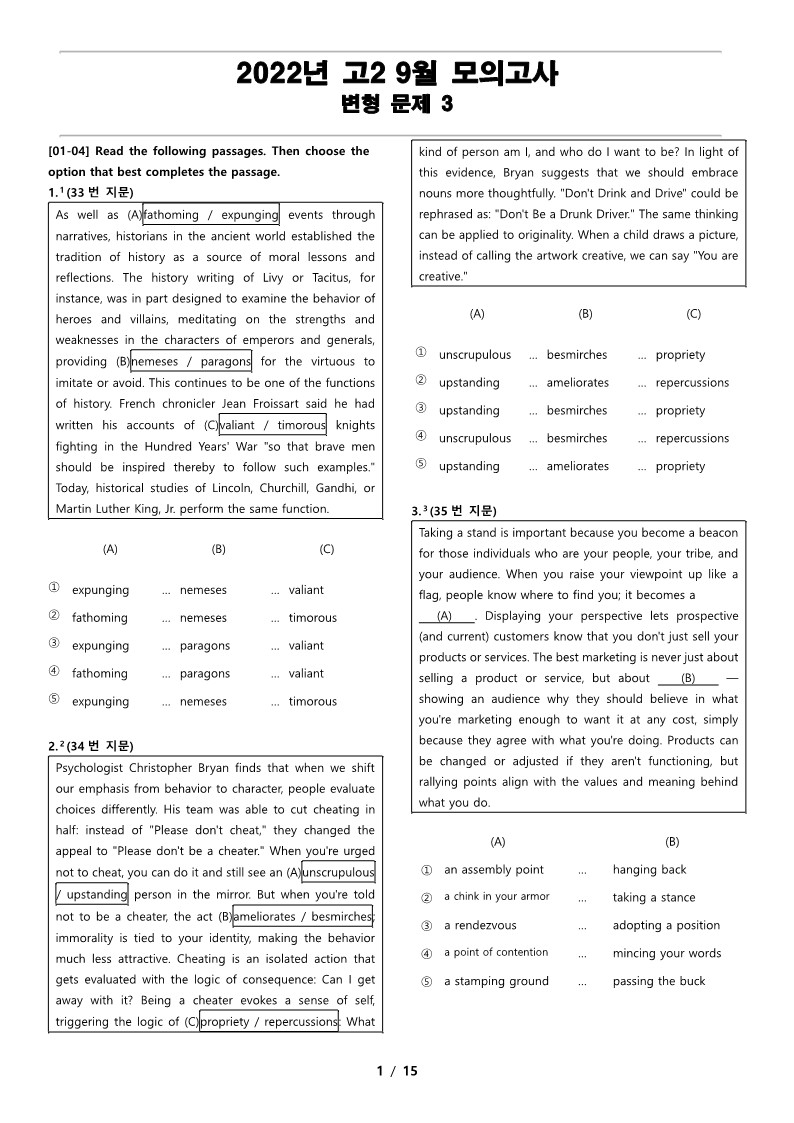2022년 고2 9월 전국 연합 모의고사
변형 문제 3
일반 워크북 형태의 문제에서 벗어나 The Makings가 만든
2022년 고2 9월 전국 연합 모의고사 변형 문제 3
출판사에서 오랫동안 영어 번역과 교정을 하셨던 원어민 선생님과
현직에서 강사를 하고 있는 연구진들이 학생들을 위한 최상의
2022년 고2 9월 전국 연합 모의고사 변형 문제 3 을 선보입니다.
사고력과 이해력을 요구하는 문제들로 내신 대비 뿐만이 아니라
수능도 한꺼번에 공부하실 수 있는 자료입니다.
중간고사&기말고사 전에 더메이킹스(The Makings)에서
제작한 2022년 고2 9월 전국 연합 모의고사 변형 문제로 마무리 하세요.
정답 확인하러 가기!
2022년 고2 9월 전국 연합 모의고사 변형 문제 3
2022년 고2 9월 전국 연합 모의고사 변형 문제, 내신대비, 영어내신자료,고등영어자료, 모의고사 변형문제,전국 연합모의고사 변형자료, 모의고사 영어 서술형 대비, 대치동 고등 영어자료, 대치
themakings.co.kr
themakings.co.kr
The Makings의 2022년 고2 9월 전국 연합 모의고사
변형 문제는 총 11개의 유형으로 구성되어 있습니다.
1. 빈칸 채우기(객관식)
2. 글의 내용 일치/불일치(객관식/한글 선택지)
3. 글의 내용 일치/불일치(객관식/영어 선택지)
4. 글 끼어 넣기(객관식)
5. 어법(서술형)
6. 어휘(서술형)
7. 주제문(객관식/영어 선택지)
8. 어휘 빈칸 채우기(서술형)
9. 영작(서술형)
10. 요약문 완성하기(서술형)
11. 문단 재배열 하기(객관식)
더메이킹스(The Makings)가 제작한
2022년 고2 9월 전국 연합 모의고사 변형 문제 3의 지문입니다.
1번 지문(문항 번호 33번)
As well as making sense of events through narratives, historians in the ancient world established the tradition of history as a source of moral lessons and reflections. The history writing of Livy or Tacitus, for instance, was in part designed to examine the behavior of heroes and villains, meditating on the strengths and weaknesses in the characters of emperors and generals, providing exemplars for the virtuous to imitate or avoid. This continues to be one of the functions of history. French chronicler Jean Froissart said he had written his accounts of chivalrous knights fighting in the Hundred Years' War "so that brave men should be inspired thereby to follow such examples." Today, historical studies of Lincoln, Churchill, Gandhi, or Martin Luther King, Jr. perform the same function.
2번 지문(문항 번호 34번)
Psychologist Christopher Bryan finds that when we shift our emphasis from behavior to character, people evaluate choices differently. His team was able to cut cheating in half: instead of "Please don't cheat," they changed the appeal to "Please don't be a cheater." When you're urged not to cheat, you can do it and still see an ethical person in the mirror. But when you're told not to be a cheater, the act casts a shadow; immorality is tied to your identity, making the behavior much less attractive. Cheating is an isolated action that gets evaluated with the logic of consequence: Can I get away with it? Being a cheater evokes a sense of self, triggering the logic of appropriateness: What kind of person am I, and who do I want to be? In light of this evidence, Bryan suggests that we should embrace nouns more thoughtfully. "Don't Drink and Drive" could be rephrased as: "Don't Be a Drunk Driver." The same thinking can be applied to originality. When a child draws a picture, instead of calling the artwork creative, we can say "You are creative."
3번 지문(문항 번호 35번)
Taking a stand is important because you become a beacon for those individuals who are your people, your tribe, and your audience. When you raise your viewpoint up like a flag, people know where to find you; it becomes a rallying point. Displaying your perspective lets prospective (and current) customers know that you don't just sell your products or services. The best marketing is never just about selling a product or service, but about taking a stand ― showing an audience why they should believe in what you're marketing enough to want it at any cost, simply because they agree with what you're doing. Products can be changed or adjusted if they aren't functioning, but rallying points align with the values and meaning behind what you do.
4번 지문(문항 번호 36번)
If DNA were the only thing that mattered, there would be no particular reason to build meaningful social programs to pour good experiences into children and protect them from bad experiences. But brains require the right kind of environment if they are to correctly develop. When the first draft of the Human Genome Project came to completion at the turn of the millennium, one of the great surprises was that humans have only about twenty thousand genes. This number came as a surprise to biologists: given the complexity of the brain and the body, it had been assumed that hundreds of thousands of genes would be required. So how does the massively complicated brain, with its eighty‐six billion neurons, get built from such a small recipe book? The answer relies on a clever strategy implemented by the genome: build incompletely and let world experience refine.
'전국 연합 모의고사 변형 문제 > 고2 모의고사 변형 문제' 카테고리의 다른 글
| 2022년 고 2 6월 전국 연합 모의고사 변형 문제 3 (0) | 2022.10.09 |
|---|---|
| 2022년 고2 9월 전국 연합 모의고사 변형 문제 4 (0) | 2022.09.20 |
| 2022년 고2 9월 전국 연합 모의고사 변형 문제 2 (0) | 2022.09.18 |
| 2022년 고2 9월 전국 연합 모의고사 변형 문제 1 (0) | 2022.09.16 |
| 2022년 고2 6월 전국 연합 모의고사 변형 문제 2 (0) | 2022.06.29 |

